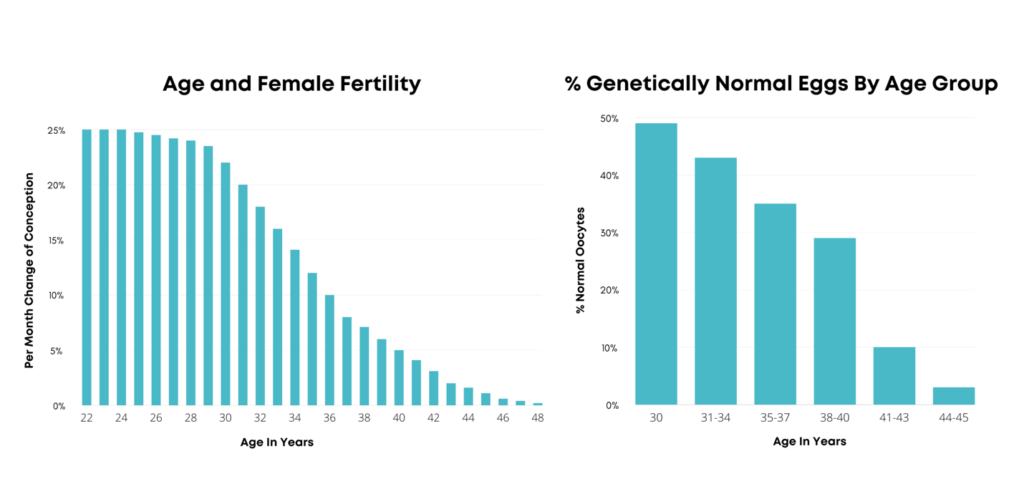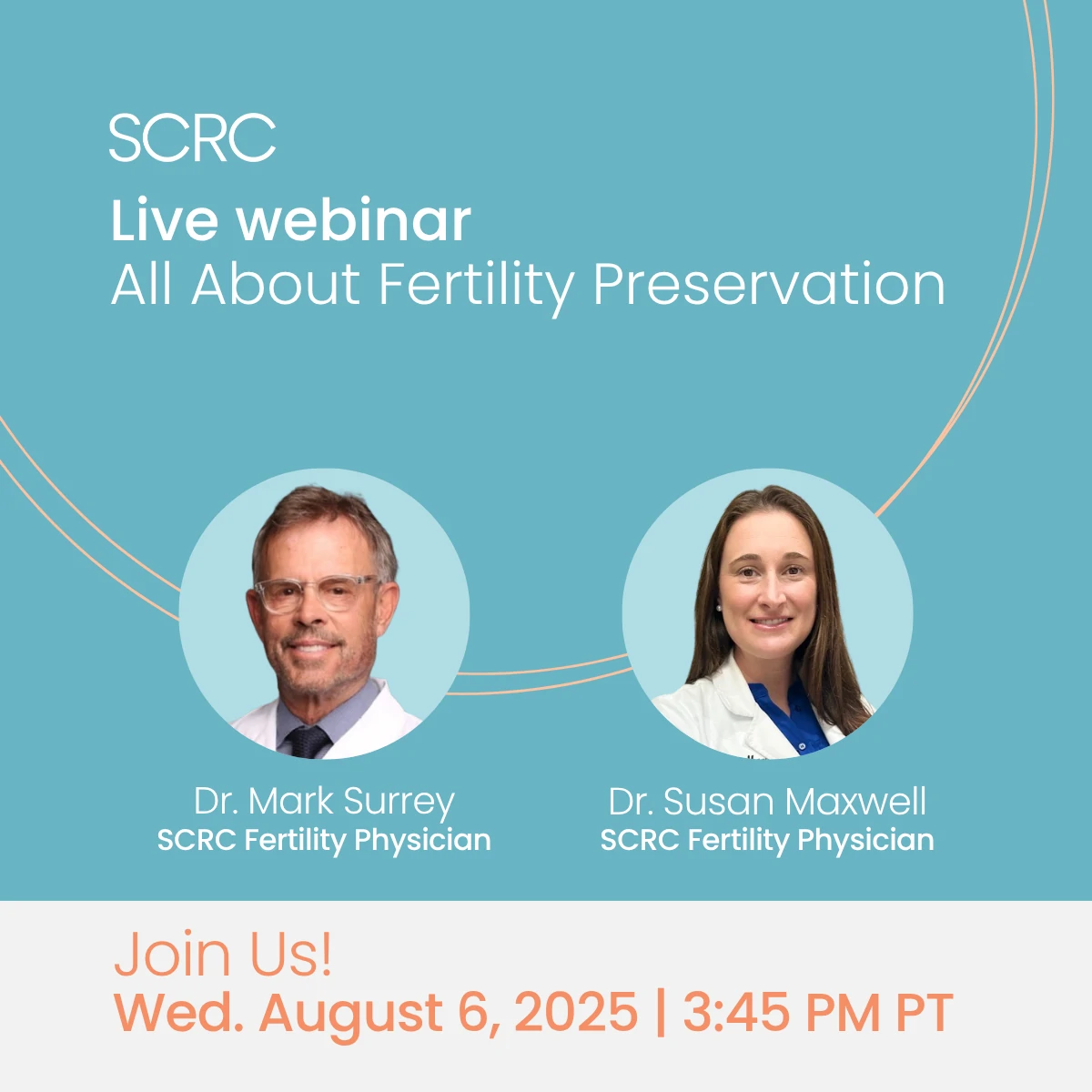Frequently Asked Questions
QWhat is the egg freezing process and timeline?
Please see the following image for a snapshot of the timeline followed by process:
Your physician and clinical team will lead you through the process, assuring a smooth and comfortable onboarding. They will ask for your medical history and run a series of blood tests and an ultrasound to determine your egg reserve, general health, and ovarian function.
Based on your test results, your physician will order medications to stimulate ovulation at a higher rate than normal to optimize egg production. The mediciation is injected into the women’s subcutaneous fat for about 10-14 days, each person’s regimen is tailored to their response.
After you have started your medication, your clinical team will monitor you regularly. At approximately day 16, you will be ready to take your trigger shot to prepare for retrieval. Within about 1 ½ days, you will come to SCRC for your egg retrieval procedure.
Egg retrieval, or oocyte aspiration, is done in an operating room at our clinic under light anesthesia in 20-30 minutes. The anesthesia benefits both the patient and the physician, both minimizing pain and keeping the patient still to increase accuracy in targeting eggs. Your physician will carefully insert a needle from your vagina into your egg follicle and exert gentle suction to pull out the fluid and eggs.
The next step occurs in our state-of-the-art laboratory where our embryologist will count the eggs retrieved, remove the protective layer of cells that is surrounding them, and then freeze the mature eggs. This method of freezing is called vitrification, or flash freezing. For more details, please visit the What to Expect page.
QAt what age should I freeze my eggs?
Every woman has a unique reason for preserving her fertility and some women do not feel they are ready to place focus on family building yet. Egg freezing will ensure you will have the option to pursue a family when you are ready.
Fertility declines with age. A woman’s age affects both the quality and quantity of egg production. At about the age of 35-37, the number of eggs a woman has available begins to steeply decline and 30% to 40% of produced eggs are considered to be normal in health. By the ages of 41-43, only about 10% of a woman’s eggs are still considered to be genetically normal. Thus, the earlier a woman freezes her eggs, the better chance of a positive fertility outcome.
QHow can I best prepare my body for egg retrieval?
“Taking the right vitamins and getting the right nutrients in your food always has a very positive effect on your overall body, which in return will help your overall fertility. The Mediterranean diet, in particular, is one I really believe in, plant-based foods such as whole grains, vegetables, legumes, fruits, nuts, seeds all in a well-balanced diet are really important,” said Dr. Shahin Ghadir, in the webinar, How To Improve Your Fertility: Supplements, Acupuncture, Mental Health, Weight & Diet. 6
“Being healthy is the most important thing you can do, so eating a well-balanced diet, not cutting out any macronutrients, is important,” said Dr. Sahar Wertheimer, in the webinar, Taking Control of Your Biological Clock.
Dr. Wertheimer continues, “Also making sure that your vitamin D levels are within range, and that your folic acid, B-12, and omega fatty acid levels are okay. We recommend COQ10 supplementation. It’s an antioxidant that’s been associated with an increased number of eggs retrieved, higher fertilization rates, and higher-quality embryos.”
It is essential to avoid toxins such as tobacco, marijuana, and alcohol while preparing your body for egg freezing. Recent studies have linked marijuana usage to lower fertility in both men and women.
In addition, certain environmental toxins called endocrine disruptors, can interfere with fertility. For example, pesticides appearing in non-organic produce such as strawberries, kale, apples, grapes tomatoes, and green peppers should be avoided. Certain household and personal care products such as cosmetics, fragrances, sunscreen, laundry detergent, bar soap, shampoo, conditioner, lotion, and toothpaste contain plasticizers such as phthalate esters. BPA is another common plasticizer often found in plastic bottles, sports equipment, and coating on the insides of cans. The more you can avoid these chemicals, the better for your fertility. 4
For more information, visit the National Institute of Environmental Health Sciences (NIEHS).
QCan I be on birth control and still freeze my eggs?
“I tell my patients if they have been on birth control for years, to come off of it for one month to allow your ovaries to recover and start functioning normally before you get ovarian reserve testing,” said Dr. Lina Akopians in, Taking Control of Your Biological Clock.
QHow long can my eggs remain frozen?
While the data is limited, the methods of egg freezing have become more sophisticated leading to better results. There have been healthy babies born from eggs at least 12 years old and experts suspect that even longer time periods may still lead to viable births.
“We’ve had a healthy baby from an egg frozen 12 years ago, which really is a triumph and a testament to vitrification, or flash-freezing,” said Dr. Carolyn Alexander, in the webinar, Is Egg Freezing Right For Me? 3
QWhat factors contribute to the cost of egg freezing?
There are several contributing factors impacting the cost of egg freezing:
- Tests and monitoring appointments – After your initial consultation, you will be scheduled for a blood test and ultrasound to evaluate your egg reserve, overall health and ovarian function. And, while you are leading up to the egg retrieval, you will have multiple visits to SCRC to check the development of your follicles and eggs.
- Fertility medication – Your physician will give you prescriptions for the medications you will need to stimulate your ovaries during your cycle. The pharmacies will send these medications directly to your home to ensure a seamless experience.
- Anesthesia – A gentle anesthesia is provided for the egg retrieval procedure to maintain your comfort and ensure the highest quality of retrieval.
- Egg Retrieval Procedure – You will visit SCRC for a trigger shot 36 hours prior to your egg retrieval procedure. When you are ready for retrieval, the procedure will take approximately 20-30 minutes.
- Storage – Storage fees are based on the length of time you wish to freeze your eggs – 1, 3, 5, or 10 years.
At SCRC, we consider education key to supporting you on your fertility journey. We welcome discussing your family planning goals, situation, and concerns. To get started, schedule an initial consultation to meet with one of our world-renowned fertility specialists.
Sources:
- The Age That Women Have Babies: How a Gap Divides America https://www.nytimes.com/interactive/2018/08/04/upshot/up-birth-age-gap.html
- Taking Control of Your Biological Clock with Dr. Lina Akopians and Dr. Sahar Wertheimer: https://www.youtube.com/watch?v=0GNA1k3GiWg
- Is Egg Freezing Right for Me? Dr. Carolyn Alexander: https://www.youtube.com/embed/7ASKfWnQA4c
- Optimizing Fertility Part 2: Environmental toxins: https://bcmj.org/articles/optimizing-fertility-part-2-environmental-toxins
- SCRC blog: What Factor Affect the Costs of Egg Freezing? https://blog.scrcivf.com/factors-affecting-costs-egg-freezing
- How To Improve Your Fertility: Supplements, Acupuncture, Mental Health, Weight, & Diet with Dr. Shahin Ghadir:
https://www.youtube.com/watch?v=6LGbXNy5frE&t=92s

